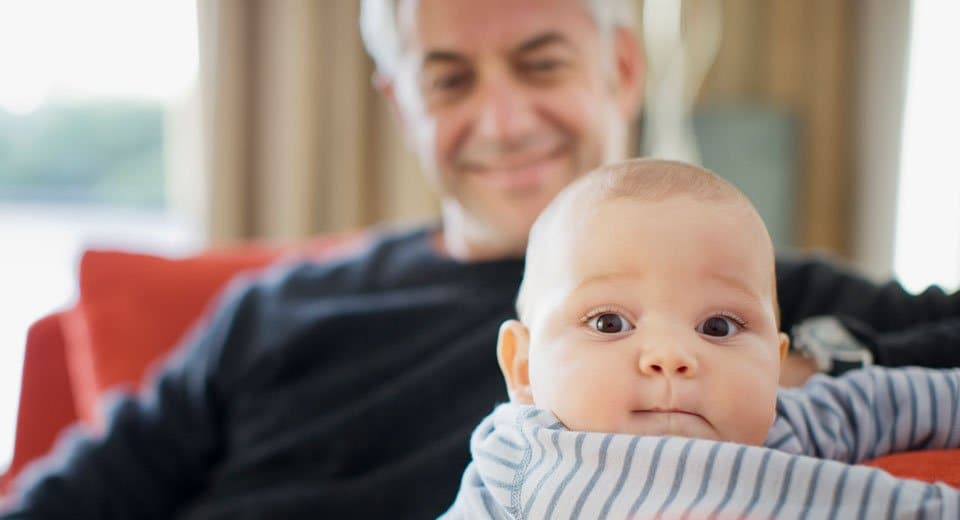4 things every grandparent should know

It’s exciting to learn you’re going to be a grandparent. But you may be surprised at how things have changed since you were raising your own children. Besides buying baby gear and child-proofing your house, you might want to brush up on the latest parenting advice.
Just as your child-rearing practices were probably different from your parents, so your children’s methods will be different from yours. Some of that is personal preference, of course, but some is based on the latest research about what keeps children healthy and safe.
One good place to start is the website of the American Academy of Pediatrics (AAP), Healthychildren.org, said Kenneth P. Colmer, MD, a pediatrician with Bass River Pediatric Associates in South Yarmouth.
Dr. Colmer is not only a pediatrician, he and his wife, Dr. Lori Zito, also a pediatrician, have three grown children. He had some updated baby-care basics to get grandparents started:
Sleeping
This might be the biggest change in the last 30 years. Since the early 1990s, the AAP has said children should always be put to sleep on their back to reduce the chances of Sudden Infant Death Syndrome, or SIDS, and other sleep-related disorders.
“‘Back to Sleep’-- it makes a big difference,” Dr. Colmer said. “The SIDS rate has dropped quite a bit, so it’s making a huge difference.”
The AAP also advises infants should sleep in their parents’ room (in their own crib, portable crib, play yard or bassinet) for at least 6 months and preferably a year for safety.
Gone are the days of tightly regimented schedules, although sleeping through the night is still a good goal.
“I let the babies set the schedule, so just go by the cues,” Dr. Colmer said. “If they are napping for three hours, you should really wake them up and see if you can keep them awake a little bit longer during the day.”
Eating
“There’s a lot changed there,” Dr. Colmer said. “We recommend solid foods between four and six months, and breastfeeding is recommended until age 1.”
There’s also a recent change in preventing peanut allergies, based on research in other countries, he said. “We recommend peanuts between four and six months. Years ago, peanut was not supposed to be introduced until age 2.”
For young babies, he recommends thinning peanut butter with a bit of water and mixing it into cereal. When babies are ready, they can try peanut snacks like Bamba puffs. Another change: Eggs are recommended at four to six months, he said. Parents used to be told to hold off on eggs until a baby was a year old.
Dr. Colmer recommends that babies -- even those who have yet to develop teeth -- try whatever parents are eating rather than only eating strained foods or sucking from pouches. Just keep bites about the size of a raisin.
“If you give a kid a blueberry or a little bit of strawberry, they will just gnaw it around with their gum and then swallow it,” he said.
Some kids do fine with the texture of adult foods although others do prefer pureed, he said. “They call it baby weaning now: You just offer it to the child and see what they take.”
And juice? Best to forget about it, he said. The AAP recommends no juice before age 1.
“It’s just too much sugar and they’re better off just eating a piece of fruit. … The best things to drink are milk and water,” Dr. Colmer said.
Pooping
Rules around a baby's output may have relaxed since your day and now recognize that babies are individuals and have different diets.
Breastfed babies are likely to have a soft stool four to six times a day, while children on formula are more likely to poop once a day, Dr. Colmer said.
“But we have some kids that poop every other day or every three days, which seems strange, but I tell parents that as long as the poop’s coming out soft, it’s not a problem. If it’s hard little balls, then the baby’s constipated and we need to do something.”
As to color, don’t worry too much. “Parents tell me, ‘the poop was green,’ or ‘the poop was yellow.’ … It doesn’t really matter a whole lot to me. As long as there’s no blood, I’m happy.”
Environment
Television recommendations also have tightened up considerably in the last few years. The Academy of Pediatrics recommends no TV under age 2.
“That advice doesn’t get followed very well, but yes, with little kids, you want to avoid TV as much as possible,” Dr. Colmer said. “They have studies that show that it affects the developing brain.”
That includes monitoring adult TV habits, he said. “In a lot of homes, the TV is just on; it’s always on.”
Instead, if a baby needs distraction; read or sing to them, he said.
“They have studies that correlate the number of books in the home to the child’s academic success later on in life. The more books that are present, the better off the child does when they’re older.”
